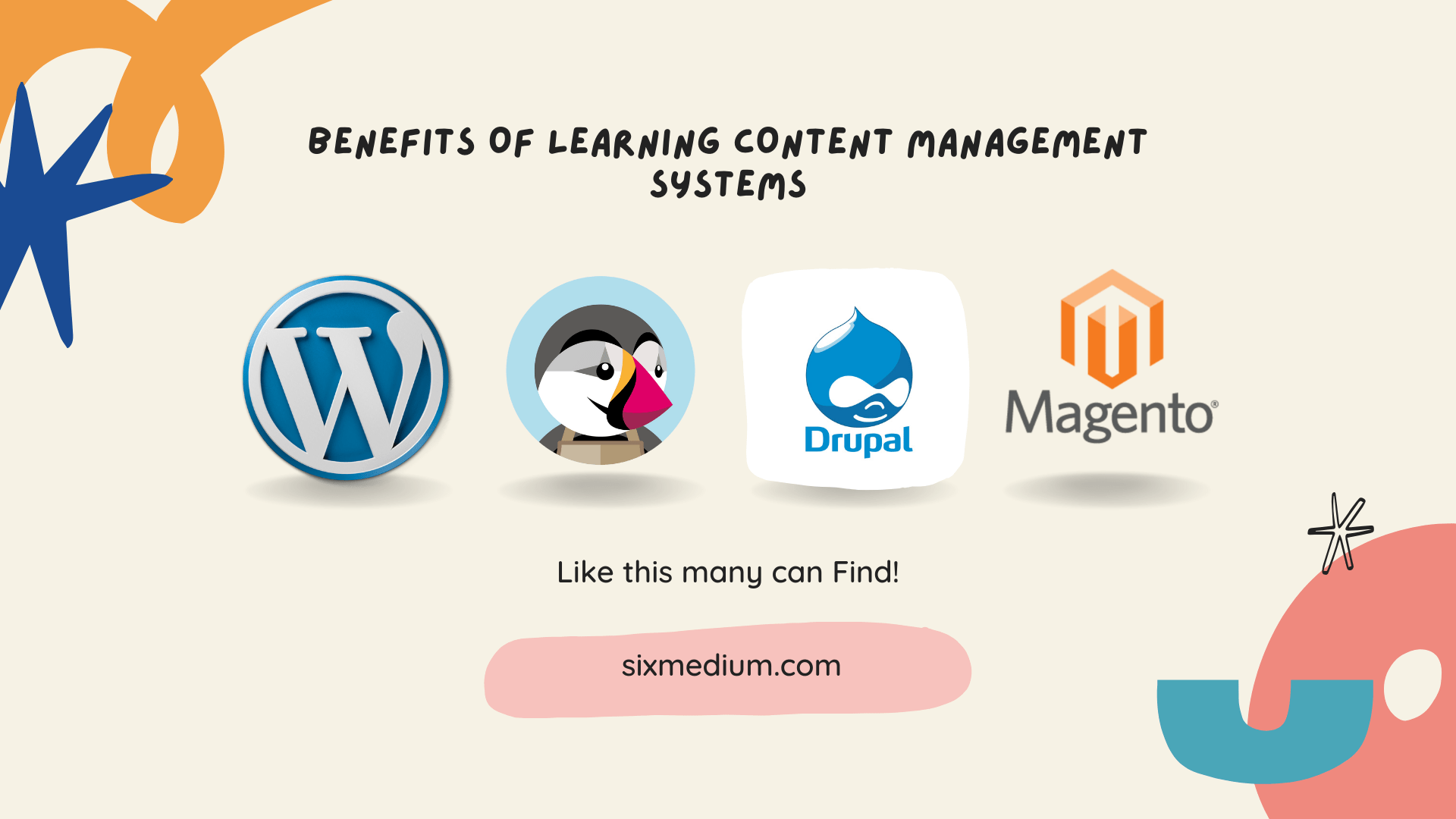Introduction:
Learning Content Management Systems (CMS) offers a host of advantages in today’s digital world. From simplifying website management to boosting online visibility, CMS skills are essential for success. In this article, we’ll delve into the perks of mastering CMS and take a closer look at popular CMS platforms and how they work.
Unlocking Opportunities with CMS Skills:
- Learning CMS opens doors to various digital opportunities. It helps individuals efficiently manage websites, create engaging content, and enhance their online presence.
- Proficiency in CMS can lead to diverse career paths, including web development, content management, digital marketing, and freelance consulting.
- CMS makes website management easier and saves time and resources. Its user-friendly interfaces enable users to publish, edit, and organize content without needing advanced technical knowledge.
- Mastering CMS provides flexibility in website design, scalability for future growth, and improved security measures to protect digital assets.
- Additionally, CMS skills keep individuals updated with evolving digital trends, ensuring competitiveness in the dynamic online landscape.
Overview of Popular CMS Platforms:
- WordPress: Widely used and beginner-friendly, WordPress is known for its simple interface and vast plugin library. It’s written in PHP.
- Joomla: A robust CMS suitable for complex websites, Joomla offers scalability and strong community support. Also written in PHP.
- Drupal: Highly customizable and ideal for enterprise-level websites, Drupal boasts a modular architecture and extensive integration capabilities. Also developed in PHP.
- Shopify: Built for e-commerce, Shopify is user-friendly and scalable, making it a popular choice for online stores. Developed using Ruby on Rails.
- Wix: Beginner-friendly with drag-and-drop functionality, Wix is perfect for creating visually appealing websites. Developed with HTML5 and JavaScript.
How CMS Platforms Work:
- CMS platforms consist of a core system, themes, and plugins/extensions.
- The core system manages essential website functions like content creation and user management.
- Themes control the website’s appearance, while plugins/extensions add extra features.
- Users interact with the CMS through a web-based interface, making content creation and management simple and intuitive.
Enhanced Website Customization:
- CMS platforms provide extensive customization options, allowing users to tailor their websites to their specific needs and preferences.
- Users can choose from a variety of themes, templates, and design elements to create a unique and professional-looking website.
- With CMS, customization is easy and intuitive, empowering individuals to express their creativity and establish a distinctive online presence.
Seamless Content Management:
- Content creation and management are simplified with CMS, thanks to intuitive interfaces and user-friendly tools.
- Users can easily add, edit, and organize content, including text, images, videos, and multimedia elements.
- CMS platforms offer features like content scheduling, revision history, and content collaboration, making it easy to maintain and update websites efficiently.
Improved User Experience:
- CMS platforms prioritize user experience, ensuring that websites are responsive, accessible, and user-friendly across devices and screen sizes.
- Features like mobile optimization, fast loading times, and intuitive navigation enhance the overall user experience, leading to higher engagement and satisfaction.
Comprehensive Analytics and Insights:
- CMS platforms often include built-in analytics tools that provide valuable insights into website performance, visitor behavior, and content effectiveness.
- Users can track metrics such as website traffic, page views, conversion rates, and more, allowing them to make data-driven decisions to optimize their websites and digital strategies.
Continuous Support and Updates:
- CMS platforms benefit from active development communities and regular updates, ensuring that users have access to the latest features, security patches, and enhancements.
- Users can also find extensive documentation, tutorials, and support forums to help them troubleshoot issues, learn new features, and stay updated with best practices.
Diverse Range of CMS Platforms:
- In addition to the popular CMS platforms mentioned earlier, such as WordPress, Joomla, Drupal, Shopify, and Wix, it’s important to recognize that there is a vast array of CMS options available to suit different needs and preferences.
- Some lesser-known CMS platforms cater to specific industries, niche markets, or specialized requirements, offering unique features and functionalities.
- Examples of other CMS platforms include Magento for e-commerce, Squarespace for visually stunning websites, TYPO3 for enterprise-level content management, and Ghost for blogging and publishing.
- Additionally, there are open-source CMS platforms like Umbraco, MODX, and Concrete5, which provide flexibility and customization options for developers and users who prefer more control over their websites.
- Exploring and researching various CMS platforms beyond the commonly mentioned ones can help individuals find the right solution for their specific projects or business needs.
Conclusion:
In conclusion, mastering Content Management Systems offers a plethora of benefits, from career advancement to efficiency gains and enhanced online presence. By exploring different CMS platforms and understanding how they work, individuals can leverage the power of CMS to achieve their digital goals effectively.


